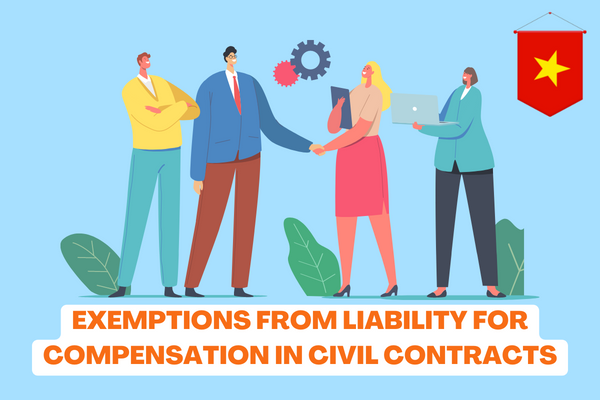Vietnam: Exemptions from liability for compensation in civil contracts regulated by law?
The concept of contracts in accordance with Vietnamese laws?
Pursuant to Article 385 of the Civil Code 2015, a contract is an agreement between the parties on the establishment, change or termination of civil rights and obligations.
Accordingly, the claim for damages as well as liability for damage is one of the important contents that the parties performing the contract must pay great attention to.
Notably, not every case of breach of contract, the breaching party must pay damages. Specifically, if requesting the cancellation of the contract, in some of the following cases, the violator of the contract does not have to pay damages:
- Due to the agreement of the two parties: Because the contract is the agreement of the parties, if the parties agree, it is possible that the breaching party does not have to pay damages. At the same time, the breach of the contract is a condition of cancellation that the parties agree on not to pay damages.
Types of contracts as prescribed by Vietnamese laws?
According to Article 402 of the Civil Code 2015, the main types of contracts are specified:
Contracts comprise the following principal types:
- A bilateral contract is a contract whereby each party has an obligation to the other;
- A unilateral contract is a contract whereby only one party has an obligation;
- A principal contract is a contract the effectiveness of which does not depend on another contract;
- An ancillary contract is a contract the effectiveness of which depends on a principal contract;
- A contract for the benefit of a third person is a contract whereby contracting parties must perform obligations for the benefit of a third person and the third person enjoys benefits from such performance;
-A conditional contract is a contract the performance of which depends on the occurrence, modification or termination of a specified event.
Besides, Article 400 of the Civil Code 2015 stipulates the time to enter into a contract:
- A contract is entered into at the time when the offeror receives the reply accepting to enter into the contract.
- If the parties have agreed that silence shall constitute an acceptance within a time limit, the contract shall also be deemed to be entered into when such time limit has expired.
- The time when an oral contract is entered into is the time when the parties have reached agreement on the contents of the contract.
- The time when a written contract is entered into shall be the time when the last party signs the contract or by other forms of written acceptance.
If a contract is entered into orally and then it is made in writing, the time when the contract is entered into shall be determined as prescribed in Clause 3 of this Article.

Vietnam: Exemptions from liability for compensation in civil contracts regulated by law?
Compensation for damages in case the breached party is at fault in Vietnam?
Due to a party's serious breach of contractual obligations: According to Article 363 of the Civil Code 2015, a breaching party is obliged to pay compensation for all damages corresponding to the extent of its fault. Therefore, if the contract is canceled because one party breaches its obligations, the other party will not have to pay damages;
At the same time, a serious violation is considered a failure to properly perform the obligations of one party, to the extent that it makes the other party fail to achieve the purpose of entering into a contract.
Article 363. Compensation for damages in case of the aggrieved party at fault
Where the breach of the obligations and damage incurred due to part of the fault of the aggrieved party, the violating party only be required to pay damages corresponding to its degree of fault.
Civil liability for breach of obligations under Vietnamese laws?
- Due to force majeure events: According to Article 351 of the Civil Code 2015, the obligor who fails to fulfill its obligations due to force majeure events is not subject to civil liability unless otherwise agreed or otherwise provided for by law.
In particular, a force majeure event is an event that occurs objectively, cannot be foreseen and cannot be overcome despite applying all necessary and permissible measures: Epidemic, natural disaster ...
Article 351. Civil liability arising from breach of civil obligations
1. An obligor which fails to perform or performs incorrectly an obligation has civil liability to the obligee.
Breach of obligations means that the obligor fails to perform the obligations on time, perform the obligations incompletely or incorrectly.
2. Where an obligor is not able to perform a civil obligation due to an event of force majeure, it shall not have civil liability, unless otherwise agreed or otherwise provided by law.
3. An obligor shall not have civil liability if it is able to prove that failure to perform an obligation is due entirely to the fault of the obligee.
- Other cases prescribed by the Law:
Thus, there are currently 04 cases, in canceling the contract may not have to pay damages in accordance with the law.
LawNet
